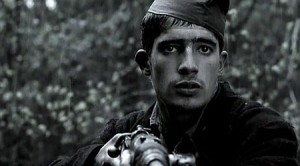
“I don’t remember who mentioned the name of Rafael Sánchez Mazas or how it came up […], but I do remember Ferlosio telling us:
‘They shot him not far from here, at the Collell Sanctuary.’”
This passage near the start of Javier Cercas’ novel Soldiers of Salamis (Soldados de Salamina, in the original Spanish) is pinpointed by the first-person narrator as the starting point of an obsession, a quest. Before the 2001 publication of Cercas’s first masterpiece (he has written another since, The Anatomy of a Moment, on the failed Tejero coup attempt of 1981), local writing on the Spanish Civil War was conspicuously rare. The task had largely been left to foreign historians, writers and journalists, from the on-site reports from the likes of George Orwell and Laurie Lee to the internationally respected studies and biographies by historians such as Hugh Thomas and Paul Preston.
The facts, if you like, had been established. But what about the truth?
Cercas’s novel juggles with a collection of elements that feel tantalizingly like definite facts: the writer Sánchez Ferlosio’s story about his Falangist father, whose life was pardoned by a Republican soldier in an incident no one else could have witnessed in a rain-swept forest; the narrator’s search for the man behind this redemptive act; the presence of Roberto Bolaño who comes up with the possible identity of the hero (the late Chilean novelist was a Costa Brava resident for much of his later life), a man called Miralles; and the apparent similitude between the journalist/novelist narrator’s circumstances and the author’s own life.
But the reader who investigates will find that this is not a straight-up piece of reportage in historical novel format. Facts are slippery, he seems to be saying. They get in the way or can even obstruct our search for a basic human truth. Why kill? Why not kill? How does something that happened during a war matter later on?
On being asked once at the Hay Festival literary gathering in Segovia about the exact relationship of Soldiers of Salamis with historical fact, Cercas said rather defensively: “If what your question is saying is that I am an imposter and a liar, then yes I am an imposter and a liar.”
With its multiple layers of (half) truths and (uncertain) realities, Cercas’s book manages to place the Civil War in a more nuanced context, far from the red beret vitriol of most other locally produced visions of the conflict. It is a human, internal war we see here. We see it from afar, but seek to relate it to our own desire for dignity in our lives. The Republican soldier Miralles may or may not be that paragon of decency. The important thing is that we want him to be.
Leave a Reply
You must be logged in to post a comment.